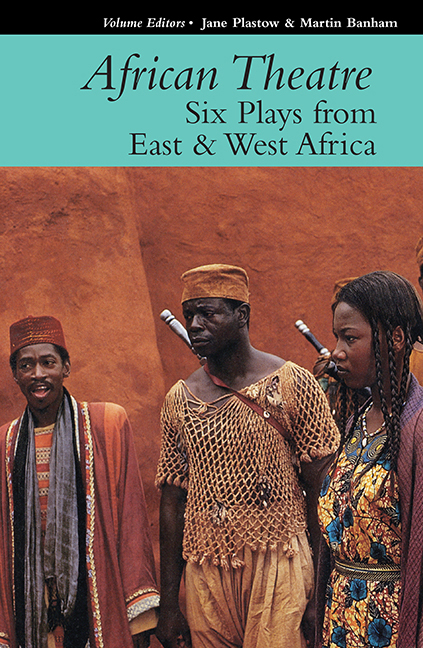Book contents
- Frontmatter
- Contents
- Notes on Contributors
- Obituary: Adieu Alain Ricard
- Preface
- THREE PLAYS FROM EAST AFRICA
- THREE PLAYS FROM WEST AFRICA
- Book Reviews
- Robert Mshengu Kavanagh, A Contended Space – The Theatre of Gibson Mtutuzeli Kente
- Edward Wilson-Lee, Adventures with the Ever-Living Poet: Shakespeare in Swahililand
- Francis Nii-Yartey, African Dance in Ghana: Contemporary Transformations
Robert Mshengu Kavanagh, A Contended Space – The Theatre of Gibson Mtutuzeli Kente
from Book Reviews
Published online by Cambridge University Press: 24 August 2019
- Frontmatter
- Contents
- Notes on Contributors
- Obituary: Adieu Alain Ricard
- Preface
- THREE PLAYS FROM EAST AFRICA
- THREE PLAYS FROM WEST AFRICA
- Book Reviews
- Robert Mshengu Kavanagh, A Contended Space – The Theatre of Gibson Mtutuzeli Kente
- Edward Wilson-Lee, Adventures with the Ever-Living Poet: Shakespeare in Swahililand
- Francis Nii-Yartey, African Dance in Ghana: Contemporary Transformations
Summary
There are few people better qualified than Robert Kavanagh to navigate the contended space of South African theatre. He was the initial driving force behind the radical company Workshop 71 that emerged from his training work at the University of the Witwatersrand in 1971, as well as the politically driven theatre journal S'ketsh, founded in the following year. On top of creating and chairing Theatre Arts departments at the universities of Addis Ababa and Zimbabwe, he was also co-founder of the extraordinary Zimbabwean children's theatre organization CHIPAWO, of which he was Executive Director until 2010. African Theatre 6: Youth includes a superb article by Kavanagh about CHIPAWO's work.
Kavanagh has also been known as ‘Robert McLaren’, as ‘RK’, and as ‘Mshengu’ – partly as a result of the need for anonymity in the charged atmosphere of the 1970s, and partly, I suspect, because a protean life and identity suit a theatre artist well. He moves with extraordinary ease from director and deviser to academic and critic, from administrator to activist, from professor to practitioner. This fluid interaction between performance and the academy is one of many aspects of African theatre that I hugely admire and envy. In British rehearsal rooms, the word ‘academic’ has come to mean ‘something I have chosen to ignore because it's inconvenient to me’; as in ‘that's a bit academic’. The academy, meanwhile, cloaks itself in impenetrable theoretical language that serves to maintain its elevated status at the cost of its accessibility. African theatre enjoys a much more open dialogue between an engaged and politically energized academy and an open, enquiring theatrical community. For people like Robert Kavanagh and myself, who have feet in both camps, the African approach makes so much more sense than the self-serving specialization of the West.
However, the subject of Kavanagh's new book, Gibson Kente, was anything but academic. The productions that he toured through black townships during the apartheid era were populist and sentimental, Christian and conservative in their morality, simplistic in their narrative, clownish in their comedy. As a result, academics and critics have tended to be very dismissive of his work. Aggrey Klaaste, writing about Kente's play Too Late for S'ketsh in 1975, condemned it as a ‘spurious bubble of happiness’, while Andrew Horn talked of Kente's ‘narrowed and absolutist melodramatic vision’.
- Type
- Chapter
- Information
- African Theatre 16: Six Plays from East & West Africa , pp. 311 - 314Publisher: Boydell & BrewerPrint publication year: 2017

